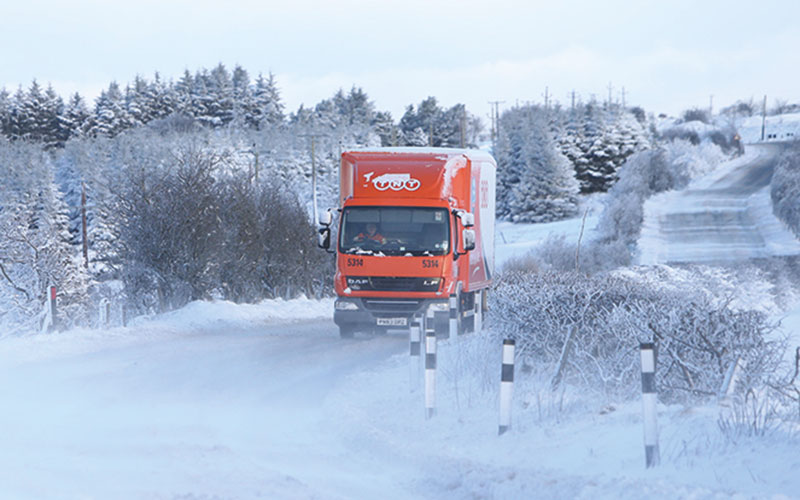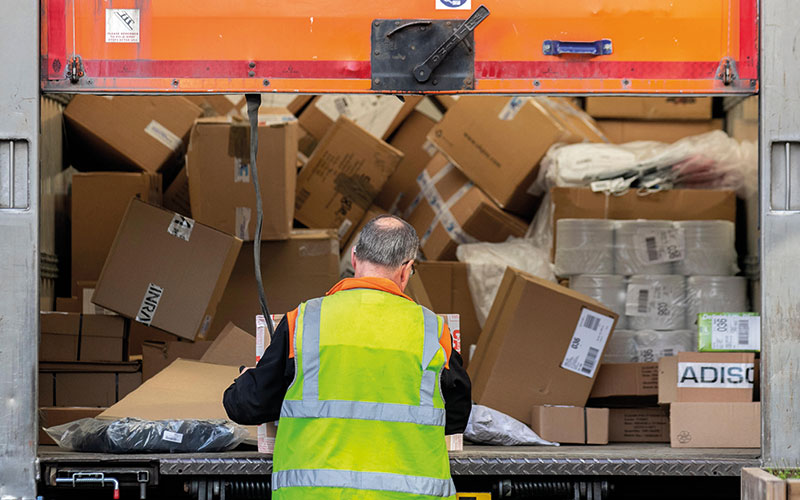Upstart: Bumpy road ahead but Sonder drives support

Colin Cottell investigates what one company is doing to help the shortage of van drivers.
Long anti-social hours, reports of people being paid just a few pence per package and the lack of career progression are just some of the negative perceptions that have grown up around being a courier driver. Alongside a loss of drivers from the EU and the exponential growth of internet shopping, these perceptions go a long way of explaining the UK’s long-standing shortage of drivers.
According to the Freight Transport Association (FTA) in November 2019, there was a shortfall of 59,000 LGV drivers in the UK, along with a persistent shortage of van drivers. And a recent report by driver recruiter Driver Require says the situation is likely to be exacerbated by an exodus of foreign drivers in response to the forthcoming changes in the IR35 rules in the private sector.
One man gearing up to take on the challenge is Tony Clarke, founder of Sonder Services. From his base in North Hants, Clarke is on a mission to promote driving as a well-paid and professional career that is open to everyone. Describing himself before making driving his career as “a very low-skilled, average person who was able to drive”, Clarke says he turned his life and career around “through training, learning and being willing to change himself and adapt”. Now he wants to help others in a similar position. Clarke says he particularly keen to target older people, and those who have left the military.
The owner of his own driver franchise in the past, who worked for almost 10 years for a large courier company before being made redundant, Clarke set up Sonder Services in October 2017 as a sub-contractor to worldwide delivery company TNT, part of FedEx. “I realised there was a big opportunity if I looked at it as a career rather than just a driving job to earn a really decent wage to support my family.”
Already earning £1k a week as a sub-contractor, Clarke says it was a traumatic divorce last year that got him thinking: “I realised there must be lots of people who go through things like this and they still need to support their family, as well as to support themselves.”
With one in five van operators saying there is an urgent need for more to be done to improve the image profile of the industry, according to the FTA, Clarke is clearly pushing at an open door as far as reputable courier firms are concerned. However, with some continuing to pay low wages, and one in five van drivers who are gig workers, thus finding it tougher than most to build a career, he accepts that the road ahead is unlikely to be smooth.
Building confidence
Charlotte Taylor, who advises Clarke on how to best support and train drivers joining Sonder, says that with most having been out of work, rebuilding confidence is a crucial part of the company’s month-long training programme. “People probably come to us thinking, ‘It is going to be a stop-gap’, and that it is not a great job and that they are having to do it,” she says. It is for this reason that partnering with Brain Boxes, a company that produces an interactive suite of tools and training programmes, changing people’s mind set is a vital aspect of the training, covering subjects such as the drivers’ self-esteem and motivation. Identifying their individual strengths is also important, she explains. “Are they going to be the really friendly courier driver, or be known for being a speedy driver?” she says by way of example.
Taylor says a key aspect is tailoring information to suit individuals. She says individuals are profiled so that they can extract the most relevant material from programmes covering subjects such as preparing for new beginnings, developing professional development plans, and creating and maintaining good mental health.
Managing expectations of what the job is and the sort of challenges newcomers will face as a business courier driver is also a feature of the training. “We prepare people and help them realise that it is actually quite a complicated job, and that there are lots of skills needed, such as planning, timekeeping, how you load the van and how you leave customers quickly without appearing rude,” she explains.
Taylor says that after the first three or four days of working as a business courier it is quite common for drivers to have up to 40 undelivered parcels in the back of their van. “They get themselves in a flap,” she says. Taylor says warning people about “the natural challenges”, such as these that they are likely to face at the start of their new career, means they are better prepared and less likely to be put off the job, potentially for good. “It’s important to sit down with people and explain this before they start, because as soon as they get into the vehicle there are a thousand and one things to think about,” she adds. That said, Taylor says that by going out on the road with Clarke as part of their training, new drivers can pick up valuable tips that make them more efficient and earn them more money, such as both delivering and picking up parcels from the same business at the same time.
We prepare people and help them realise that it is actually quite a complicated job, and that there are lots of skills needed, such as planning, timekeeping, how you load the van and how you leave customers quickly without appearing rude”
Changing mindset
Rather than deal with the sort of issues faced by – often vulnerable – people driving in isolation, Taylor says the company takes a holistic approach. “If you run a course for people leaving the military on how to change mindset and they come out and can’t find a job, their mindset isn’t going to account for anything, and if you offer them a job without the mindset stuff they are going to struggle in work,” she says.
Sonder’s employment model can also be tweaked to suit individual’s preferences, says Clarke. “People can be employed on a yearly wage, perhaps to build up their confidence in the system, and then move into being a self-employed contractor,” he explains. While one of his younger drivers prefers the certainty of a set number of hours a day and a stable income, those who need a higher income tend to choose self-employment, which includes having their own vehicle.
As he seeks to take on more recruits, Clarke says drivers who are released by some courier companies when they reach a certain age are on his radar. “I know people that get made redundant at the age of 60, but because they know the area they are very good trainers,” he says, adding that two such people are about to come on board.
Although nine people have already been through Sonder’s programme, as far as Clarke is concerned he has yet to get out of first gear. Although he has already been in touch with the Jobcentre and is happy to take people referred by them, Taylor says the aim is for Sonder’s training to be recognised as a stamp of quality. “Currently if someone goes to a courier agency, they are always going to pick someone that has two years’ experience over someone who hasn’t got any experience, even though the experienced driver might have picked up some really bad habits and have a bad attitude.
Those that that wish to push themselves could be turning over £100k and have their own depot within five years”
Tony Clarke, founder of Sonder Services
“We are not going to have enough jobs for everyone we train, so we want our training to hold value, and in turn to raise the standards of the industry.”
People who leave the military are also in Sonder’s sights, and Clarke says he has already been in contact with a number of military charities. “These are people who joined at the age of 18, and come out having done 20 years at a low level in the military, and are likely to end up contributing to numbers of homeless and drug users; these are the people we are trying to capture,” says Taylor.
Despite their often challenging backgrounds, Clarke has high aspirations for his charges. He has already identified two drivers with the potential to go on to greater things. “Those that that wish to push themselves could be turning over £100k and have their own depot within five years,” he says.
Clarke’s own plans include upgrading his fleet of vehicles from the current vans to larger vehicles. In the summer he plans to move to Byfleet, where he intends to recruit more drivers, followed by rolling out the programme with more Jobcentres. “While there are still people out there who we can change how they think about the driving job, our target will never stop and we will keep building,” he says.
 Case study
Case study

Roy O’Byrne says becoming a courier driver with Sonder has given him hope. After spending most of his working life as a general labourer, he says that at the age of 53, “I didn’t think there was very much hope of changing my career”. But after joining Sonder just before Christmas, he says his outlook has been transformed. Describing his previous working life as a series of “thankless jobs, where you never get anywhere, and where I felt trapped, I now have hope that I can be more than somebody else’s lackey”. After only a few months with Sonder, O’Byrne, who in the past has spent time in prison, says he has identified “a viable career path”, and has ambitions to have his own drivers.
O’Byrne says he underestimated the job of courier driver. Not only the decent money he now earns, but because it is lot more complex and involved than he previously thought. “For want of a better term I thought it was for dummies. I didn’t realise,” he says. Among the skills that he has developed is time management, something that he says he has also been able to apply to his life outside work.
Image credit | Alamy
